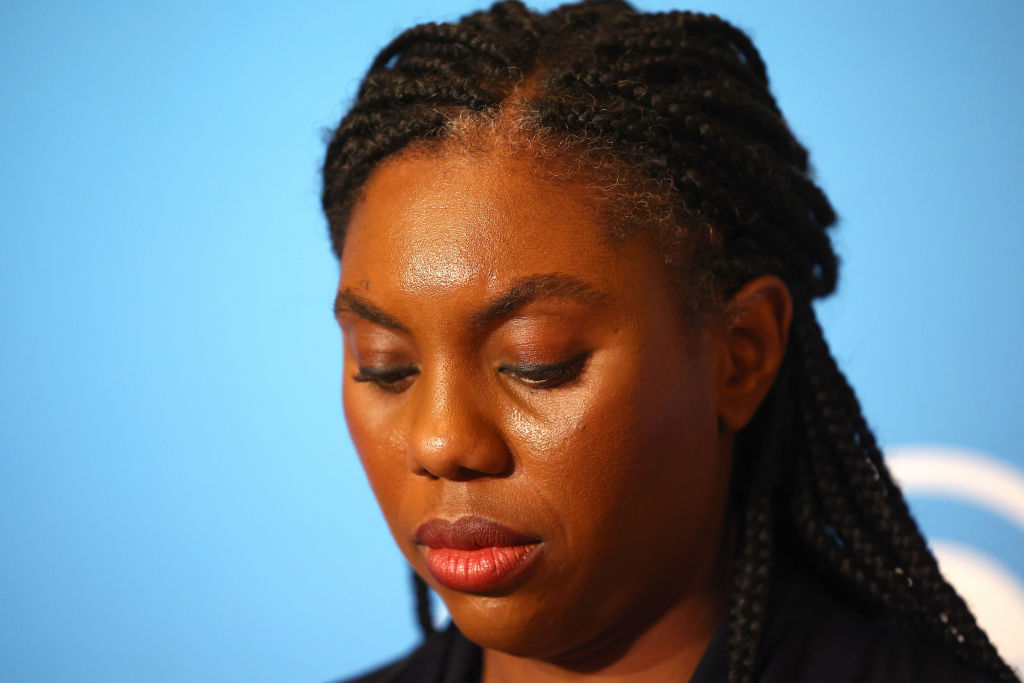A new year in British politics will begin with a radically revised electoral outlook. The latest electoral model from More in Common, for the Sunday Times, shows Labour losing 183 seats, which would wipe out the majority it won in July. These findings are bolstered by a similar new study from JL Partners, which also shows a triple-figure seat loss for Keir Starmer’s party.
On the face of it, this is encouraging news for Kemi Badenoch. Starmer, unlike Tony Blair in 1997, is already crumbling. However, Badenoch has a problem that previous Tory leaders never had to face in Opposition — a rival party on the Right. Reform UK already has five seats and would, according to both electoral models, win more than 70 next time.
The detailed analysis from More in Common shows another remarkable feature of the new electoral battleground, which is that 271 of the 650 constituencies would be won with less than a third of the vote. With things so finely balanced, Badenoch doesn’t have to reassemble the entirety of the 2019 Conservative electoral coalition, just some of it.
As to how this might be achieved, the Conservative leader isn’t short of unsolicited advice. Newspaper columns put forward policy prescriptions which, we’re assured, would bring the Tory tribes back together — and just happen to coincide with the authors’ own agendas. A more basic piece of advice would be to pick a strategy and stick with it.
Right now, all Badenoch is doing is picking fights — most recently by rising to Nigel Farage’s bait over party membership numbers. This is not strategic: it just gives her Right-wing rivals more publicity and allows them to set the agenda. It also puts off the decisions that actually matter. For instance, does Badenoch want to concentrate on winning back ex-Tories from Reform — or does she want to target those who defected to the Liberal Democrats and Labour?
If she’s picking the Reform path, then why such a sour attitude towards a party which provided a safe haven for so many alienated Tories? Badenoch would do well to realise that you catch more flies with honey than vinegar. If, however, she’s intent on winning back centrist voters, then why are the likes of Tom Tugendhat and James Cleverly missing from her shadow cabinet?
There is another path: not a messy compromise between the other two, but an effort to strike out in a direction that’s distinct from populist simplicities and centrist complacency. Given the hole in which the country finds itself, the Conservatives could position themselves as the party of hard truths and tough decisions. However, in Opposition, that would require a seriousness about policy that the Tories never had during 14 years of government.
In 2025, it will be easier for Badenoch to take this Tory third way than to force her divided party to the Left or the Right. It’s also a better fit for her own ideological instincts. But where are the signs that she’s redirecting party resources — and her own attention — accordingly?
The Tory leader should remember that her three predecessors — Boris Johnson, Liz Truss and Rishi Sunak — were each, in their own fashion, undone by a lack of discipline. If she wants to avoid the same fate, she needs a strategy — one which doesn’t just set a direction, but enforces consistency of thought and action.











Join the discussion
Join like minded readers that support our journalism by becoming a paid subscriber
To join the discussion in the comments, become a paid subscriber.
Join like minded readers that support our journalism, read unlimited articles and enjoy other subscriber-only benefits.
Subscribe